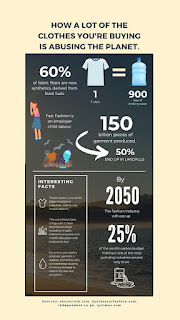The damages of the popular materials used by the fashion industry
Why is conventional clothing so damaging?
To understand our motivation for the procurement of sustainable materials in the first place, we must dissect what exactly is wrong with the current materials that are popular in the fashion industry. The environmental demise caused by material usage can be illustrated by simple facts.
One conventional cotton t-shirt takes up 900 days of drinking water
150 Billion garments are produced, 50% of them end up in landfills
60% of materials are derived from fossil fuels
Every time you wash a polyester garment, microfibers are released into the water system
What’s wrong with conventional cotton?
Cotton is made from seed-hair fibers from the cotton plant. While technically since it is a natural plant is serves better than polyester alternatives, however, it is one of the most environmentally demanding plants. Cotton is extremely environmentally demanding due to it being very water-intensive to cultivate cotton. To be more candid, it takes up to 10,000 and 20,000 gallons of water to make a single pair of jeans and up to 3,000 gallons of water to make a T-shirt. Due to the rising demands of the fashion industry, conventional cotton uses high levels of pesticides and toxic chemicals that seep into the earth and water supplies. Not only do the high levels of pesticides and toxic chemicals sprayed on conventional cotton have environmental impacts, but they also have a human impact as in third world countries with around 20,000 individuals dying of cancer, suffering miscarriages, and other health issues.
What makes “organic” cotton different?
Organic cotton is 80% rain-fed which means that it drastically decreases the amount of drinking water used in the cultivation of organic cotton. It does not use any chemicals or pesticides while growing the plant which decreases the impact on the environment and our health. Organic cotton is certified by external bodies that are unbiased and do testing at manufactures to ensure that their materials are cultivated safely with fair trade principles.
FAIVIASHCares Instagram: https://www.instagram.com/faiviashcares/?hl=en
FAIVIASHCares Youtube Channel: https://www.youtube.com/channel/UCyicmgSS4RFyN9aQKoYI44A
FAIVIASHCares Linkedin: https://www.linkedin.com/showcase/faiviash-cares
FAIVIASHclothing Instagram: https://www.instagram.com/faiviashclothing/?hl=en



Comments
Post a Comment